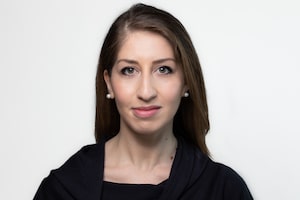People hold signs at a protest organized by Hungary's opposition members, outside the headquarters of the Moscow-backed International Investment Bank, after Russia's invasion of Ukraine, in Budapest, Hungary, on March 1.MARTON MONUS/Reuters
On Feb. 18, three days before Russian President Vladimir Putin formally recognized the independence of two separatist regions in eastern Ukraine, the Russian-backed leaders of Donetsk and Luhansk announced a civilian evacuation to Rostov Oblast in Russia. Ukrainian President Volodymyr Zelensky was planning an imminent attack, the puppet leader of Donetsk (falsely) claimed, warning that the Ukrainian military’s guns were “aimed at civilians, at us and our children.”
The escalation of violence in the region (on the instant messaging service Telegram that day, the Donetsk People’s Republic militia claimed it had intercepted an attempt to blow up a sewage plant) and the mandatory evacuation order was the final pretext for the “special military operation” Mr. Putin would announce a few days later, beginning his invasion of Ukraine. It was the culmination of years of Russian propaganda about terrorist attacks, genocide against Russian speakers and fascist extremists in the Donbas that the Kremlin had been promoting ever since the Maidan revolution of 2014.
The propaganda, of course, didn’t stop last week when Mr. Putin declared war on Ukraine. While the fiction that the invasion was about “liberating” separatist regions in the east was exposed almost immediately as Russian troops seized Antonov Airport and advanced toward major cities, including Kharkiv and Kyiv, Russian state news was hyper-focused on the shelling of a school in Donetsk, which it attributed to the Ukrainian military (though it was likely part of a series of attacks by Russian-backed separatists). And one week into a war that has united the Western world and upended foreign policy traditions – Switzerland shelved its position of neutrality and Germany agreed to send lethal weapons to a combat zone – the Russian narrative has largely stayed the same: their forces are bravely clearing the Donbas of enemy combatants, they say, while Western powers conspire to levy cruel anti-Russian sanctions.
Russia-Ukraine live updates: Canada bans Russian ships; Zelensky urges EU to prove ‘you are with us’
Ottawa to help Ukraine expedite petition to probe alleged war crimes by Russian forces
This narrative is now being challenged, however, by images of Ukrainian children sleeping in metro stations, videos of the apparent cluster bombing of residential areas in Kharkiv, and social media posts of regular citizens taking up arms to defend a country Mr. Putin said was not real – citizens who, according to state media, were supposed to welcome invading Russian troops as liberators. It is being challenged by reports of Russian tanks running out of fuel or being abandoned, and of Russian athletes, celebrities and artists speaking out against the war.
Thousands of Russian scientists, academics, journalists and other professionals signed an open letter calling this war “a cynical betrayal” of the memories of their fathers and grandfathers who fought actual Nazis. They see the Ukrainian President fighting alongside his citizens after rejecting an offer for a U.S. evacuation, while their President won’t even come within six feet of his top advisers. Russian media is not operating in the relative silo it was even just one week ago. Mr. Putin’s cold fictions are being countered by disturbing and emotional accounts of the inhumanity of his actions.
In an essay published on his Substack last week, war historian Lawrence Freedman noted that the first few days of this war have reminded us that “the morale and determination of those defending their country tends to be higher than that of those mounting an invasion, especially if they are unsure why they are doing so.”
“[The Ukranians] have not been rolled over,” he wrote. “A quick fait accompli would have helped Putin a lot.”
Yet every day that this “special operation” continues is another day the Kremlin has to spin in service to a noble cause. Russian soldiers are being captured or dying. The ruble has crashed. People are entering long queues to withdraw cash from ATMs, only to find that there is no money left. They are shut out of international airspaces, and can’t even watch their sports teams compete internationally after being kicked out by FIFA and UEFA. Russia has become a global pariah. And for what? Because there are Nazis in Donetsk? The Russian people certainly aren’t strangers to suffering, but how much suffering will they endure when it isn’t clear who and what they are fighting for?
“Putin, like most autocrats, has a residual fear of his own people,” Mr. Freedman observed in his essay. And it’s likely that his fear is growing; thousands of Russians have, from the very first day of the invasion, bravely taken to the streets to protest the vanity and barbarity of a war based on the delusions of an aging spy with festering historical grudges. In recent days, Russian politicians, the municipal council of Yakimanka in Moscow, and even oligarchs have spoken out about the invasion of Ukraine. To those outside the state-media sphere of influence, it is clear that this is Mr. Putin’s war – not the war of the Russian people. Yet, as the casualties mount and suffering compounds on the average Russian citizen, the Kremlin will have to work ever harder to sell the myth that all of this death and devastation is in service to a greater cause.
Keep your Opinions sharp and informed. Get the Opinion newsletter. Sign up today.
 Robyn Urback
Robyn Urback